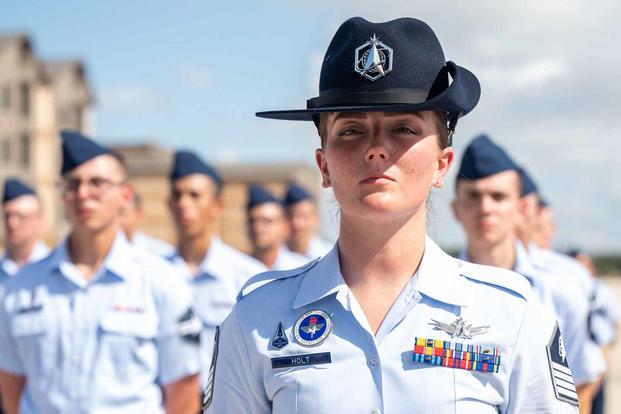This is the second story in a three-part series that follows recruits through the first-ever boot camp just for Space Force Guardians. Over three months, Military.com interviewed more than a dozen Guardians, drill sergeants, recruiters and officers, and visited the two-month basic training in Texas to show the new Guardians’ path from the recruitment office to graduation day.
Read the entire series: Part 1 | Part 2 | Part 3
SAN ANTONIO -- The Space Force recruits sat on their bus at 3 a.m. on May 3, the warm engine idling in the cool, predawn Texas air as it parked outside their aged, concrete dormitory.
For a moment, it was quiet ... then Tech. Sgt. Michelle Holt erupted.
"Get off the bus! ... Get lined up! ... Put your bags away!" the Space Force drill instructor shouted at the passengers. They scrambled off the bus with nothing but a backpack, a combination of shock and awe washing over them.
They were among 72 men and women who would make history at Joint Base San Antonio-Lackland, Texas, in May and June as the first two flights of Guardians to be completely trained by instructors from the Space Force, the first new military service branch to be created since 1947.
Read Next: Congress Eyes Extra Pay to Counter Wave of Suicides in Alaska and on Ships in the Yard
Some of the outlines of the training, focused on discipline and following orders, closely mirror what the other services have been doing for decades. If done incorrectly, the simplest tasks, such as folding socks, standing in place and saying your name, would be met with shouting from drill instructors.
"When we took that bus ride over, I could see the [training instructors] standing outside, and I was like, 'Well, this is where it begins for me,'" Jesse Costello, an 18-year-old recruit from Buffalo, New York, recalled to Military.com.
That first week was tough on Costello, who initially dreamed of joining the Air Force to be a pilot but was disqualified because of a hearing issue, and his fellow recruits.
"I think we all were very, very stressed on just getting things done with people yelling at you constantly," he said.
But over the seven-and-a-half weeks of basic training, they would learn what it means to be a Guardian in a branch that has set out to attract, train and field a different type of service member. They score higher on testing, bring unique skills and may win an easier pass on the military's demanding physical fitness standards.
These 72 Guardians, and the process they go through, will be a litmus test for how the new military service is growing and changing, a service that is still figuring out its identity and trying to decide what defines a Guardian in the midst of the typical wrangling between branches for resources and personnel, with the Space Force's older peers hesitant to surrender hard-won responsibilities and assets.
The service is also trying to walk a careful tightrope, publicizing its openness to a more diverse slice of America in the quest for skill sets that will help the Space Force complete its mission, while wary of falling into stereotypes based on the fact that most Guardians will work behind computer screens.
In the historic class of recruits who headed to San Antonio, many were unapologetic nerds with a love of science fiction and academic knowledge that ranged from language fluency to memorized facts about the solar system.
Some struggled with the possibility of washing out and seeing their hopes of serving in the military extinguished.
Military.com spent two days on the ground in Texas and was granted access to the basic training, including interviews with recruits who shared their experiences. The accounts provide a window into the Space Force vision for the entry-level training as it works to carve out its own traditions, gain a footing and forge an identity separate from its sister service, the Air Force.
The crop of new recruits from across the country had taken the plunge to enlist and after long anticipation had finally arrived at Lackland to start their military careers.
'They Come Preloaded'
On the base, part of a dormitory had been turned into a makeshift classroom, complete with old-school style writing desks, breakaway walls on wheels and some pieces of cardboard were taped to the windows to block the heat of the Texas sun from beating down on the Guardians as they studied.
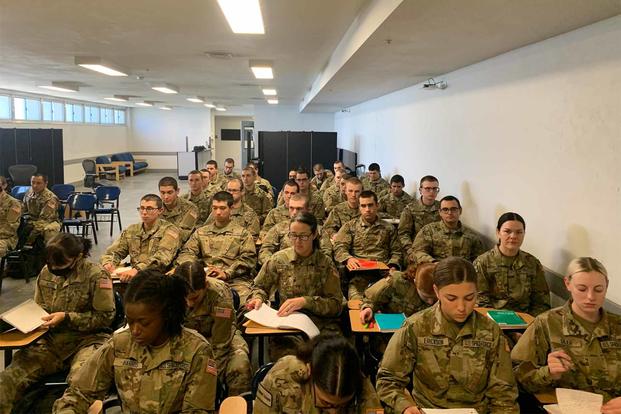
Desks, chairs and couches were donated by an Air Force reserve component so Space Force drill sergeants and leadership could work out of the building. Classes were held near the same area where the new recruits slept and drilled.
During a lesson about the Molniya orbit path of satellites, Maria Pryde, a 32-year-old Guardian and recent immigrant from Belarus, informed the class that Molniya means lightning in Russian.
"I think sometimes a lot of people don't know that I speak Russian and it kind of surprises them," Pryde said. "So, I was kind of proud that I could maybe have a certain extra skill that would help in our efforts."
Space Force Guardians go through an additional 35 more hours of classroom instruction, compared to airmen. They learn about the origins of the newest military service branch, the global threats in space and the various satellites under the branch's control.
The Guardians score significantly higher on the Armed Services Vocational Aptitude Battery, or ASVAB, to get in, and the new service is relying on that knowledge to build out its ranks.
In another classroom presentation, this time on threats in space, a Guardian raised his hand and gave a scientific definition for solar flares, and referenced a geomagnetic storm caused by the sun in 1859, called the Carrington Event, when telegraph offices were set on fire from the space anomaly.
At one point when a drill instructor struggled to pull up a PowerPoint presentation during a lesson, a Guardian guided him through a way to share his computer screen on the projector.
"They are smart. They come preloaded with culture and history," said Maj. Clinton Emry, the commander of the 1st Delta Operations Squadron Detachment 1, which oversees basic military training.
Other boot camps focus on starting from scratch with civilians and molding them into the service, but Space Force leaders and drill sergeants said they are taking another approach with basic military training, or BMT.
"We're not trying to break them down and build them back up, like what you'd hear in a traditional BMT," Emry said. "We actually honor their individual contribution of where they came from."
Despite the humble dormitory and its donated furniture, the boot camp has significantly evolved from where it was two years ago.
In December 2020, the first seven Space Force Guardians were trained by Air Force drill instructors and graduated alongside airmen. The experience was barely distinct from troops enlisted into their sister service branch. They were simply given a Microsoft tablet with materials about the Space Force to study.
Now, eight dedicated Space Force drill instructors will graduate around 500 Guardians each year, with a service-specific curriculum ranging from the subtleties of emotional intelligence to the intricacies of space warfare.
Culture of Acceptance
The different approach of the Space Force boot camp is apparent from the beginning.
Recruits in the other military services aren't called airmen, soldiers, sailors or Marines until they graduate from basic training. But in the Space Force, recruits are called Guardians shortly after they arrive, creating an immediate culture of acceptance instead of the common boot camp mentality that the title must be earned.
More Guardians will also graduate compared to the other services' basic training. On average, only about 5% won't make it through, while the Air Force has about a 7%-8% attrition rate. It is significantly less than the Navy, Marines and Army, which have boot camp attrition rates from 11% to 15%.
The Space Force, the smallest military branch, runs on an equally small budget, and military leaders want to make sure the Department of Defense doesn't waste money on recruits who won't pan out.
The Guardian recruits still experience many of the staples of other boot camps, such as a segment borrowed from the Air Force's initial training. They must strain through push-ups, sit-ups and a 1.5-mile run during physical training tests, and learn to march in formation in the Texas heat. They rough it in a mock deployment and learn to assemble, clean and fire an M4 carbine rifle.
But the average Guardian will likely spend the majority of their career staring at a computer screen, not through a rifle scope. Emry, the commander of the 1st Delta Operations Squadron Detachment, knows it's unusual.
"Why do Guardians even need to march during [basic training]? We don't march in our jobs; we sit at a computer. Why do we shoot a gun?" he said.
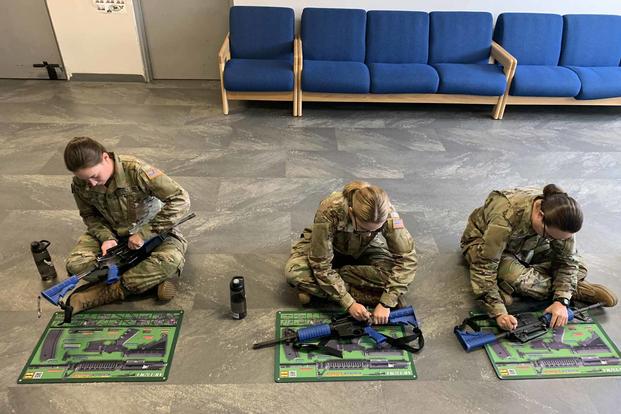
The way Emry sees it, they're serving their country just like America's other service members. That requires discipline, sweat and a sense of duty. They need to know the little things before they take on the vastness of space.
"We're using a weapon system, either a radar, a space domain awareness sensor or you could be flying a satellite," Emry said. "If you understand a weapon system and how it functions at a fundamental level, then you understand how you interact with that weapon system and that you are an important player here."
Chess and Dungeons and Dragons Cliques
The Guardians weren't all multilingual or science whizzes. They were also college football players and quiet school band kids, with ages ranging from 17-39 years old. And it was clear they still stood out at Joint Base San Antonio-Lackland.
"Sometimes you can notice it when you go to, like, chow or you're going to chapel services, people will be like, 'Oh, you're in the Space Force?'" said Callum Tizard, a 21-year-old Guardian from Arizona. "And it really does kind of make it seem like we're a lot smaller than what we are."
A large majority of the Guardians' nearly two months at Lackland is spent in their dormitory building away from the airmen, underscoring the feeling of separation. During boot camp, they began forming their own cliques.
"Probably two weeks in, everybody had their groups that they all like to be around," Tizard said.
Some gathered around a shared interest in chess, he added. "We are the Space Force, and we get a bad rap, but some of them play Dungeons and Dragons."
Pryde, who turned 32 during basic military training, was afraid before going off to boot camp that her age would be a problem -- and at first the age gap was noticeable. But after a few weeks, she said everyone began to respect those differences.
"We have a few ladies with me that are 19 or 17 years old, and every day, they surprise me with how smart they are and how intelligent they are. And I learn from them," Pryde said.
Sebastian Montesdeoca, a 24-year-old Guardian from New Jersey, is a Colombian-born athlete who played college football. He said the other Guardians come from different backgrounds and may not have been the people he would have hung out with back home. But he had come to respect them during basic training.
"One thing I heard from our commander over here is, 'You don't have to like the person that saves your life,'" Montesdeoca said. "And I fully believe that, because there may or may not be people I genuinely love and they're not my best friends here, but I will always respect them."
To Montesdeoca, everyone seemed very intelligent. The real differences between them would become apparent outside of the classroom.
Fitness Versus Talent
Just before 5 a.m., Guardians marched in formation in the predawn darkness to the track. Anxiety and silence were hanging over them.
It was time for their physical training qualification. The Space Force relies on the longstanding Air Force test, which consists of push-ups, sit-ups and a 1.5-mile run.
Montesdeoca, the former football player, was aiming high, hoping to power through 80 push-ups in two minutes. Other, less active Guardians, were dreading having to do more than 20.
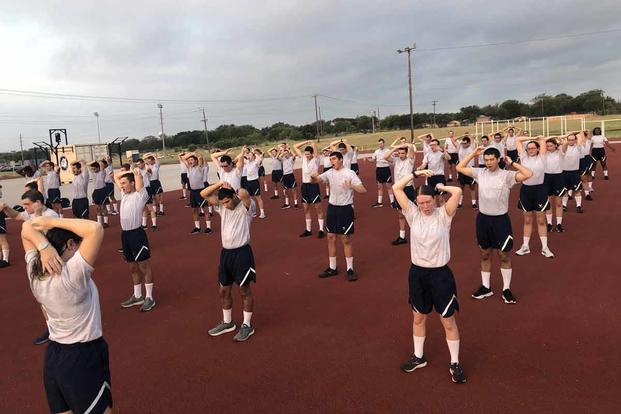
It became clear shortly after the test began who came to boot camp physically prepared and who didn't. Some Guardians started to walk the last lap of their mile and tried their hardest to pick up the pace when a drill instructor told them to give it their all.
But there may be a lifeline for those struggling to clear the PT requirements.
Air Force Col. Jeffery Pixley, the commander of the 737th Training Group at the base, told Military.com in an interview that there is more leniency for the Space Force because of its size, and that with guidance from drill instructors and other leadership, more waivers are possible.
"With Space Force's smaller numbers, I can see why the senior leadership of Space Force would be hand-wringing about even one person getting eliminated; that ought not to be," Pixley told Military.com. "If it's the right risk decision, we can retain people that are exceptional."
The new military service needs bodies and it's a necessity for its specialized jobs to be filled, said Space Force Senior Master Sgt. Anthony Chua, who has helped develop the policies and guidance for the basic military training.
That means in rare cases, a Guardian who is failing physical training could get more time to pass.
Chua said that Guardians are given 180 days to pass their first physical training assessment, as long as they've met the other standards for graduation and are deemed to be of extraordinary character and have faced no other disciplinary actions during boot camp.
"Is fitness going to weigh more than the talent that we need?" Chua said. "That's the biggest question, right? We don't want to fail our mission; we need to do everything we can to make them graduate."
'Take It One Day at a Time'
While it's likely a large majority of the Guardians will eventually pass the physical fitness test or be given extra time to do so, there are still recruits who don't make it to graduation because of medical or mental health issues.
After the PT test, Costello, the 18-year-old from Buffalo, New York, who wanted to be an Air Force pilot, sat in the dormitory feeling nervous, and some of the eagerness he had when jumping off the bus on his first night seemed to have dimmed.
He wasn't allowed to go to the track with his peers that morning. A minor hearing issue had previously disqualified him from joining the Air Force and opened a door to the Space Force instead, presenting him with a chance to accomplish his dream of joining the military.
But on Costello's third week, he was flagged again. He didn't disclose to Military.com whether it was the same issue that stopped him from joining the Air Force, but it appeared to be serious enough that the possibility of not graduating was on the table.
He was told by his drill instructors to stay optimistic, but he wasn't allowed to participate in the final physical training test while his file was being reviewed by superior officers.
"I have some medical things going on right now that haven't been going my way," Costello said. "So I'm really, really worried about that ... Right now, I'm just in a holding pattern, and I've been told to just take it one day at a time."
Drill instructors who were confident, at first, that Costello's condition wouldn’t be a problem seemingly sure that his waiver would be approved. But, when Military.com arrived at boot camp in week five, military leadership seemed a little less optimistic about him going through, noting that time was moving fast and there were only two or so weeks until graduation.
Costello was relying on his fellow classmates to help him block out distractions. Although his future wasn't within his control, he was still going to give boot camp everything he had.
'The Beginning of Something Really Big'
By week five, many of the Guardians had grown accustomed to military life, and the reality of serving their country beyond basic training began to seem near.
They looked forward to heading to the barbershop to get fresh buzz cuts, another way to beat the extreme Texas heat. Guardians, armed with safety scissors, had become trained to cut every loose thread from their uniforms. Young men and women, some of whom have never held a rifle, were able to disassemble and reassemble an M4 carbine expertly in five minutes.
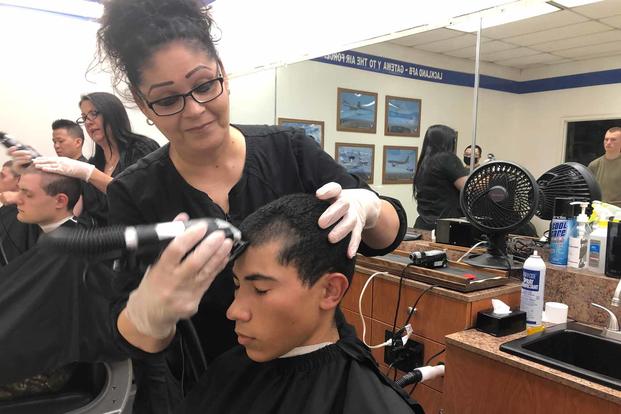
But their bubble of isolation inside the military base -- no distractions from smartphones, friends or televisions -- was regularly pricked by reminders of conflict and chaos on a group bulletin board with a list of daily news headlines. They were often incomplete, like the halftime score of the second game of the NBA finals between the Golden State Warriors and Boston Celtics, or an incomplete reference to something said during the Johnny Depp and Amber Heard celebrity civil trial.
Pryde had scanned the headlines for news of Ukraine, a neighbor to her birthplace, Belarus, during the first few weeks of basic training. But she had to stop herself. It was too painful to think about the friends and people she knew suffering under the brutal invasion by Russia, which had already dragged on for months and had stoked geopolitical tensions in Europe to levels not seen in generations.
"It just feels like it's the beginning of something really big and something really, really bad, and to know how much people struggle and how many people have been hurt and how many lives have been destroyed, it's really, really heavy," Pryde said.
As a Guardian, Pryde could very well play a key space role in the renewed conflict in Europe, one that is still evolving.
The Space Force is now protecting ground satellite systems against cyber attacks and is monitoring for missile launches across Europe to alert allies. The service is also watching in case Russia tests another weapon in space and endangers America's satellites.
In a few weeks, the classroom lessons and push-ups would all be a memory. Pryde and hopefully the majority of her flight would graduate into the service and into an unstable world, where those responsibilities of satellites and security would fall on their shoulders.
A few Guardians wouldn't make it to graduation. But for those who would get to take the oath, military leaders such as Gen. John Raymond, the chief of space operations for the Space Force, and Chief Master Sgt. Roger Towberman, the service's senior enlisted leader, would be on hand to praise their accomplishments.
With the ceremony on the horizon, Raymond, Towberman and others were anticipating the upcoming graduation as a historic moment for the force's enlisted men and women -- the start of something new. It would be a symbol of their vision for what the service's own basic training could eventually grow into.
Pryde was motivated to keep pushing toward that graduation because of her desire to help protect other countries. She became an American citizen to join the Space Force.
But basic training had already given her something precious. She had celebrated her 32nd birthday there, and it was the same day she received her camouflage military uniform. To her, that meant more than anything she would have gotten for her birthday back home.
"It was truly a gift," Pryde said. "And every time I wear it, I see the American flag, and I remember where I come from, and I remember the road here and how hard it was."
-- Thomas Novelly can be reached at thomas.novelly@military.com. Follow him on Twitter @TomNovelly.
Read Part 1: Inside Recruits' Journey to Space Force's First Boot Camp
